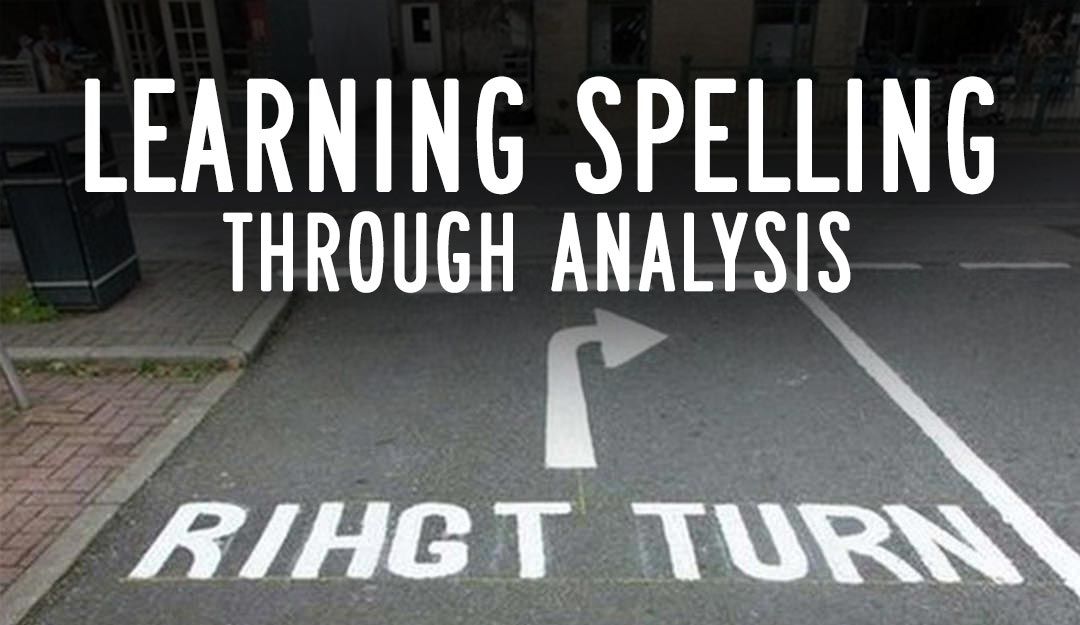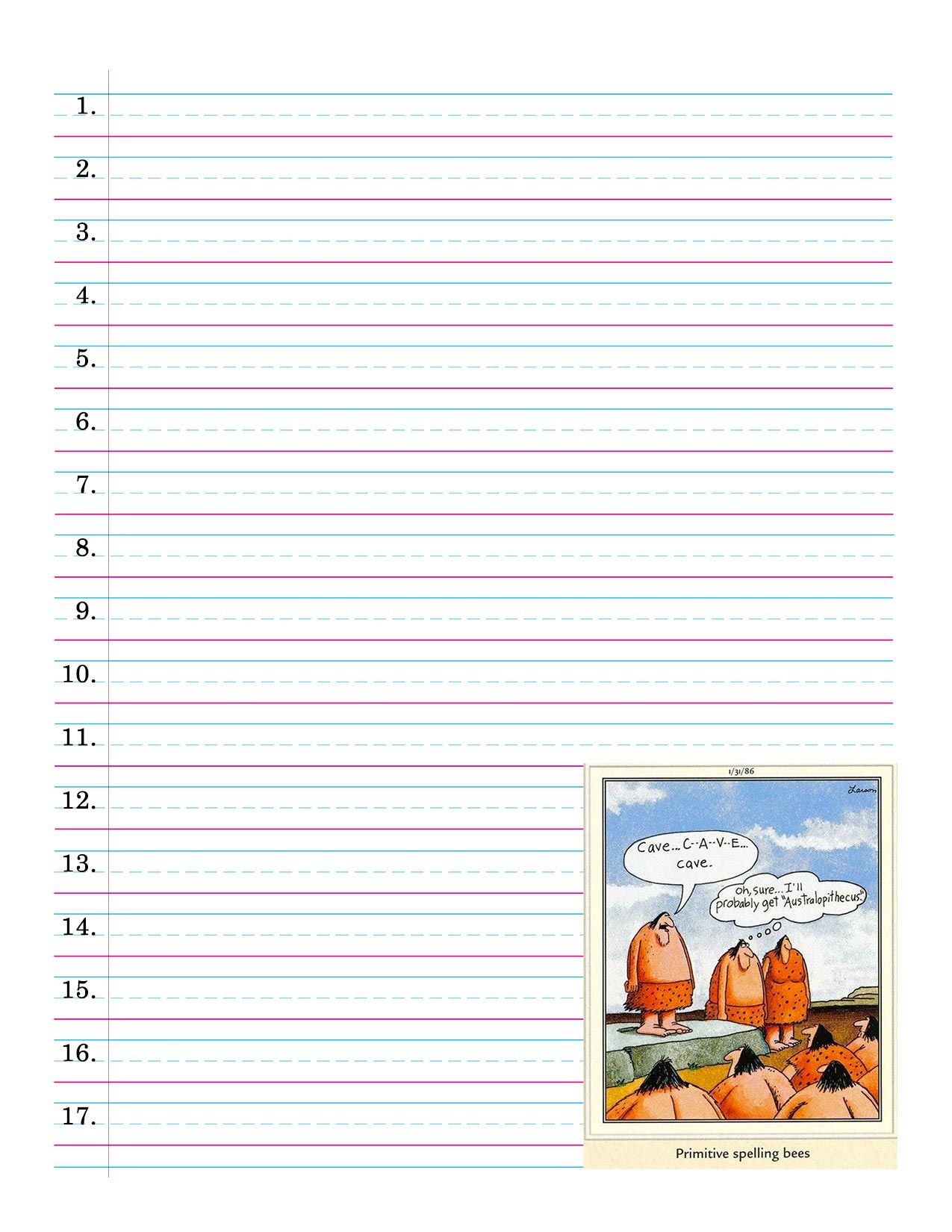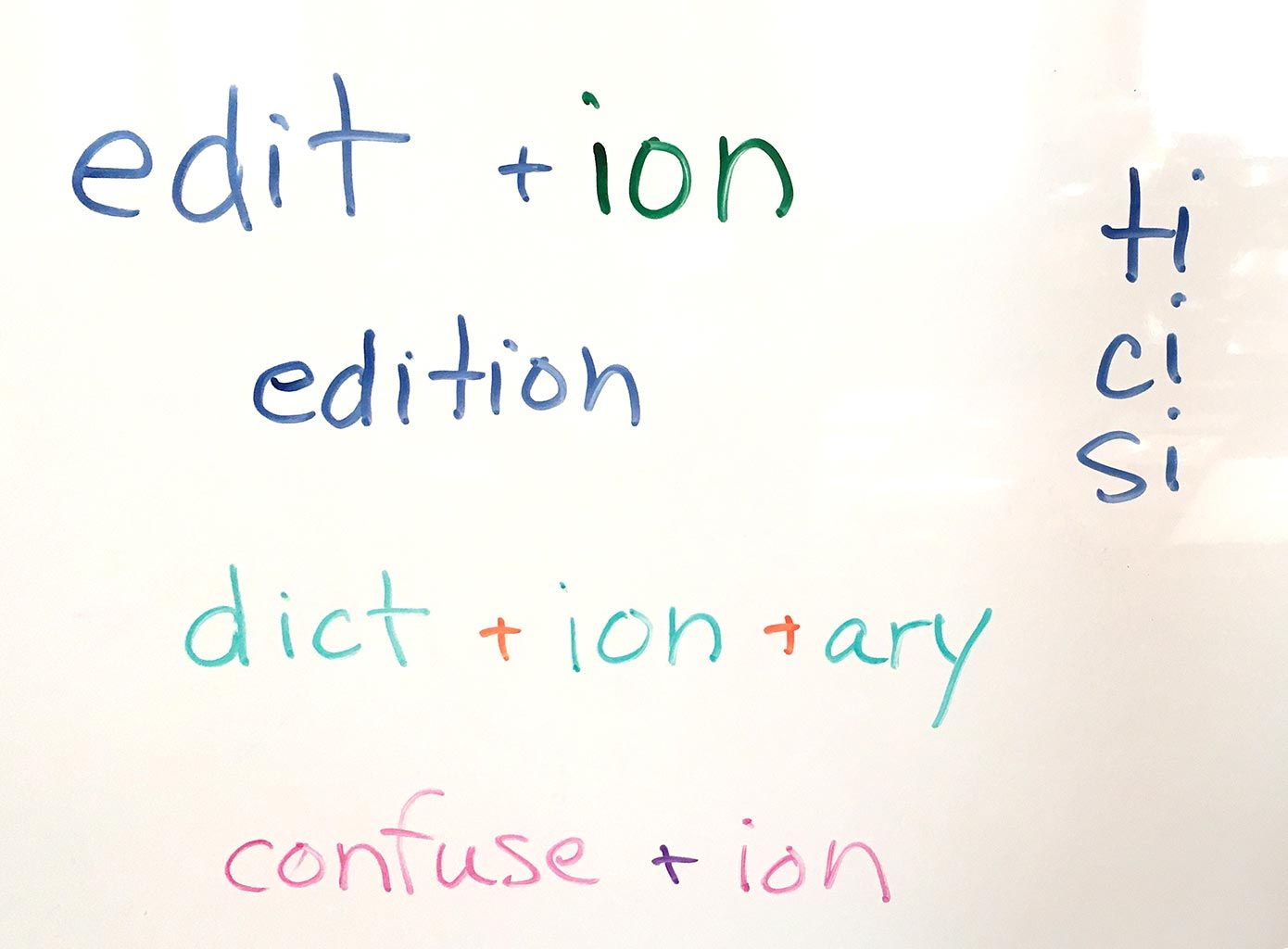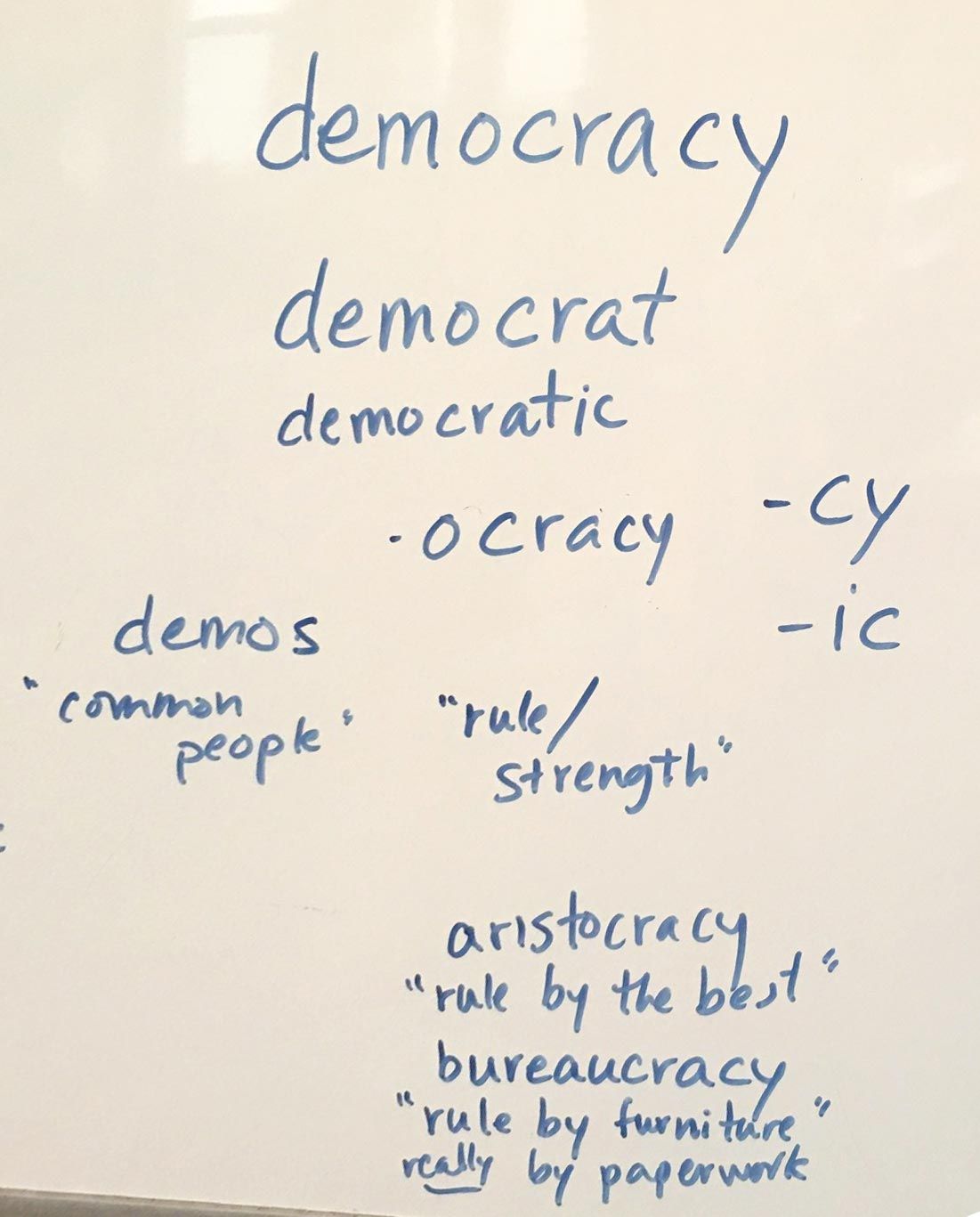Learning spelling through analysis
Instead of using an off-the-shelf spelling curriculum, we're doing our own spelling analysis, focused on words we care most about.


This is long-ass post, here are the sections, so you can scroll down to the good stuff:
- Recipe-blog-style blathering about ~our spelling journey~, totally skippable
- How we're doing our spelling analysis, this is the good stuff
- A list of resources to help you teach spelling, also good
Recipe-blog-style blathering about ~our spelling journey~
We recently completed our first language arts curriculum, Logic of English Foundations. We both learned a ton about spelling because of its phonics focus, and I'm grateful to have filled this gap in my own education.
As much as we loved what we learned from Foundations, we're not continuing with the next level, called Essentials. The whole Logic of English program has great content, and is presented very well, but it's not the best fit for my kid. It's a bit too dry, and a lot too slow.
(I have looked and haven't yet found a program for teaching phonics to young kids who already know how to read. Phonics are often considered a last-resort remediation for kids who have trouble learning to read, but I know I'm not alone in seeing the value in learning phonics for kids who pick language structure up easily. If you see an accelerated version of an Orton-Gillingham phonics program, particularly one targeting gifted kids, let me know! We're already on the other side of this stage of learning, but I'd still like to hear about it.)
Michael Clay Thompson is now our main language arts curriculum, but it does not cover spelling. Wanda still has a lot to learn about spelling, but I also don't feel like it needs a heavy focus right now. A lot of improvement will happen on its own as she writes a word, notices it doesn't look right, and puzzles it over.
But I also don't want the knowledge we've built up to fade from disuse. If there was a great spelling game out there, that could be fantastic, but I haven't seen any good ones. Games like crossword puzzles and Wordscapes require accurate spelling, but Wanda hasn't been sucked into them. And a game isn't the same as focused thinking about what's happening in words to make them spelled the way they are.
I looked for some spelling curricula, but didn't find a slam-dunk. They feel like overkill for us right now. Two that I have my eye on in case we want to go hard in the future are All About Spelling and Spelling Workout.
I did find something that sucked me into a rabbit hole for a while, called Structured Word Inquiry. It's an interesting idea: your kids ideally take the lead with some support from you, picking a word they're curious about and exploring everything about its meaning and structure. This includes identifying its root and its affixes (affixes = prefixes + suffixes), exploring all of the other affixes that can go with that root to form related words, and talking about why it's spelled the way it is.

I found a lot to like about idea of Structured Word Inquiry, but in practice, as prescribed by its adherents, it's hella overwrought. Digging deeper, some of it started to feel a bit quacky. It seems that some of the people who bought in have bought in SO HARD that it has become The One, True Answer.
As in all things parenting, I took what I liked about Structured Word Inquiry and tossed the rest. As in all things homeschooling, I talked over our options with my kid, and we came up with our own thing.
How we're doing our spelling analysis:
- As I notice Wanda misspelling a word, instead of pointing it out and disrupting her flow, I add it to a list of spelling words I keep in my phone.
- If she asks me how to spell a word, I tell her, and add it to the spelling word list.
- Wanda wanted to write down any spelling words she's curious about on a window using a dry erase marker. She's so far done this zero times, and that's fine.
- I've created special writing paper for use in our spelling analysis, with handwriting lines and a The Far Side comic about spelling in the corner.

- About once a week, I pick out eight or so words, and we analyze the spelling of each one.
- For each word, I say it out loud, and use it in a sentence, and she takes a whack at spelling it on her own. We use everything we learned from Logic of English Foundations: she breaks out the sounds in the word, takes her best guess at which phonogram is responsible for each sound, and writes it down.
- If she easily spells it correctly, we move on. This isn't uncommon, even though these are words I saw her recently misspell. There's a difference between focusing her brain on spelling and focusing her brain on sharing a thought. Taking a moment to think about the word's spelling is sufficient, eventually it'll become more automatic in general use. And if it doesn't, it'll show up on our spelling list again and we'll spend more time on it.
- If she misspells the word, I gently nudge her to figure out what's not quite right on her own.
- Sometimes, a sound in the word could be made by several different phonograms. I ask her to identify the possible phonograms, and she tries some others out, often getting to the right spelling.
- Sometimes, there's either a schwa sound happening in an unstressed symbol, or what we call "monk-y business": in order to improve legibility, monks started spelling the /u/ sound with an "o" when it's next to letters with a lot of vertical lines (as in "mother" and "wonderful").
- Sometimes, a suffix hasn't been attached to the word correctly. We have a simple flow chart from Logic of English that lays out how to attach a suffix. I pull it out and have her check her work.
- Increasingly, the path to helping her figure out the proper spelling of a word is to identify the root. She's gotten quite good at identifying roots, and likes learning the etymology of words, and trying to guess on her own if a word came from French, or Latin, or Greek. We have fun researching the etymology together, and explore other related words.

- Our moments of deeper analysis are often about the way the /sh/ sound gets made. To the whiteboard!
There are five different ways to spell the /sh/ sound: "sh" (as in share), "ch" (as in chef), "ti" (as in nation), "ci" (as in special), and "si" (as in mansion). "sh" is the obvious one, but it only gets used at the beginning and end of base words, with the one exception of its use in the suffix -ship. "ch" only makes its /sh/ sound in French words. Most often we're needing to figure out whether the sound is coming from ti, ci, or si, and the answer most often is found by identifying the root. Once you understand that the root of "edition" is "edit", that "ti" makes total sense. Wanda was able to quickly identify the root "dict" in "dictionary" because we've learned about that root in Michael Clay Thompson, so the phonogram "ti" made sense. She figured out that the root of "confusion" is "confuse," so of course that's going to use the "si" phonogram (you've probably noticed that's a /zh/ sound, not a /sh/; another clue to the spelling is that only the "si" phonogram makes that /zh/ sound). - Once Wanda has figured out the way a word is spelled, she erases what she had down and replaces it with the correct spelling, and re-writes it once or twice to build a little automaticity with the correct spelling.

Wanda really likes this way to work on her spelling. It's relevant, because it's pinpointed on words she uses and hasn't yet mastered. It's fun, because I make up silly sentences for the spelling words, and because we get curious and look up the history of words. We're often up and moving around: at the whiteboard, grabbing the dictionary, grabbing the iPad. It goes pretty quickly, so we aren't getting bogged down in something boring. If we run out of steam, we can call it good and save the rest of our words for another day.

Here's an example of what we did with Wanda's curiosity about the word "democracy." We identified the suffixes, then looked up the root, and the etymology of each piece of the word. We looked up related words, and talked about meaning: for instance, when we talked about the meaning of the pieces in the word "aristocracy," we identified that it means "rule by the best" and then talked about who decides who is the best? Based on what? These turn into great vocabulary lessons.
Resources to help you teach spelling
If you'd like to learn enough to guide spelling analysis, without doing an entire-ass phonics curriculum, oof!, I recommend these resources:
- Uncovering the Logic of English by Denise Eide
This book is written by the same woman who developed the Logic of English curricula. For $15 you can learn everything much faster and cheaper than doing the whole Foundations curriculum. It's for you, not the kid, though. - Phonogram & Spelling Rule Quick Reference from Logic of English
This is everything from the Logic of English curriculum, boiled down into a fold-out cheat sheet for nine bucks. I use it a lot. - Phonics with Phonograms app from Logic of English
This is an iPhone/iPad app. It's old, isn't being updated, and may not be long for this world, but it's a handy tool. We use it as an audio reference, it lets you hear all the sounds each phonogram makes, and tells you some basic rules about their use. - Foundations Lite Free Digital Course from Logic of English
This free online course debuted just as I completed our curriculum, so I've not looked at it, but I bet it's useful for getting an idea how to do spelling analysis. - Online Etymology Dictionary, a.k.a. Etymonline
I have a few different tools for looking up etymology, this one is my favorite. Also available as an iPhone app.

